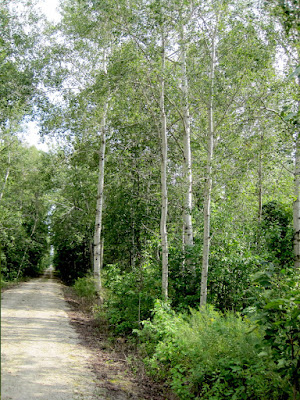It is a great time of year to get outdoors and hike whenever and wherever one can. Here are some photos of the plants found while hiking the Ice Age Trail near to The Gardens at Waters East, a special place in this Watershed. The trail roughly follows the location of the terminal moraine from the last Ice Age of 11,000 years ago. It travels for 1200 miles across the state of Wisconsin.
Enjoy the hike!
The easy definition of a watershed is: the area of land where all the water that is under it or drains off of it goes to a shared destination. In the case of Gardens at Waters East, Lake Michigan is that destination.
All gardens exist within a watershed. And, all gardeners know the vital importance of watershed areas. If the watershed is healthy, all life there stays a little healthier. What is done on the surface in our gardens and surrounding areas can impact what ends up being in that final watershed destination. Gardeners know the importance of good stewardship for the patch of land where they live. They know too that what they do on their land will affect the health and wellbeing of all who depend on the quality of the area’s watershed.
Gardens at Waters East is located in the state of Wisconsin where there exist more than 12,600 rivers and streams that travel a total of 44,000 miles. More than 32,000 of those miles are perennial streams. There are 2,700 trout streams covering 10,370 miles. There are more than 15,000 lakes, 5.3 million acres of wetlands, 1.2 guadrillion gallons of groundwater. All this forms two different watersheds which drain either into the Great Lakes (and for Gardens at Waters East specifically Lake Michigan), or the Mississippi River which itself eventually drains into the Gulf of Mexico. Wisconsin is blessed with such an abundance of water as a natural resource. The best of gardeners realize the responsibilities they have to care for the health and wellbeing of the watershed where they live.
These all flow directly into Lake Michigan which itself is one of the five Great Lakes which together contained 20% of all the fresh water on Earth. Many past and future postings often showed and will continue to show Lake Michigan as a “backdrop” to garden pictures. This is done to remind all visitors to the gardens not only of the beauty here, but also of the importance that Lake Michigan and the Great Lakes have for all life in this area.
The photos in this posting are of the national Ice Age Trail, a section of which is only ten miles from the gardens. It runs through the watershed of the Gardens at Waters East.


















Beautitul photos from your hike! I love to see all the wildflowers in your area. There are many flowers at the trail who lives in my garden too, but I have bought them. They don't live natural here.
ReplyDeleteThe trilliums are so pretty.
Trilliums are here in the thousands - REALLY. The deer love them, and me too! However I do not eat them like the deer jaja.
DeleteThank you for vissiting my blog. In English, the berries are called "cloudberry" simply because they resemble a cloud. cloudberry are mostly used in Nordic cuisine, and only grow in cold climates.
ReplyDeleteI did get to research them on the internet and learned more about them. Something I had never seen.
DeleteWhat a beautiful hike!
ReplyDeleteI agree! Beautiful and interesting.
DeleteSo many treasures to find along the Ice Age Trail! I've done some sections, but I'd like to do more. :)
ReplyDeleteI have friends who have walk the entire 1200 miles. They have ambition!
DeleteWhat an interesting route with all the flowers. I have never seen wild ginger before.
ReplyDeleteMany different plants along that part of the Ice Age Trail.
DeleteInteresting flowers grow around of Gardens at Waters East. I liked Lady's Slipper, it's cute.
ReplyDeleteLady's Slipper is a member of the orchid family. It grows wild here and I too like it lots!
ReplyDelete